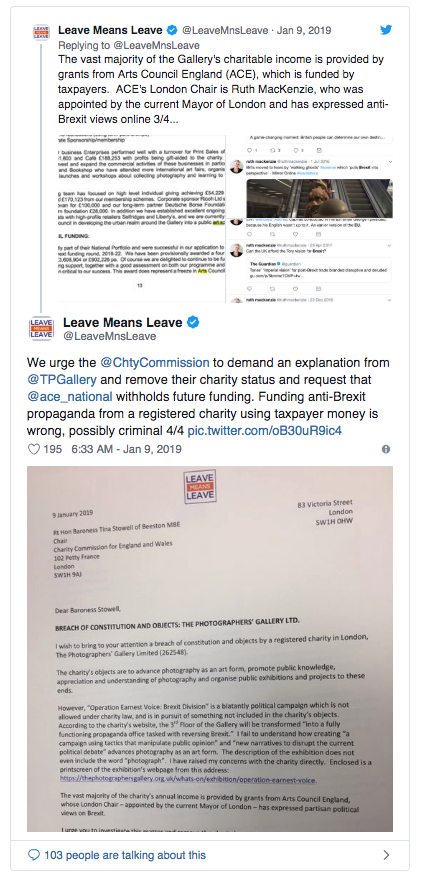Ahead of today’s vote, angry Brexiteers have called for the gallery to lose its charitable status for exhibiting Jonas Lund’s project about “online manipulation tactics” that can influence voting.
 Jonas Lund’s project Operation Earnest Voice ran at the Photographers’ Gallery from January 10–13 (image courtesy Photographs’ Gallery)
Jonas Lund’s project Operation Earnest Voice ran at the Photographers’ Gallery from January 10–13 (image courtesy Photographs’ Gallery)
As the United Kingdom braces itself for a consequential vote on Prime Minister Theresa May’s Brexit deal today, January 15, the Photographers’ Gallery is battling accusations from the pro-Brexit group Leave Means Leave that they used taxpayer money to fund political propaganda.
The group has written a letter to the country’s Charity Commission requesting that the Arts Council of England withhold future funding from the gallery as punishment for its four-day exhibition of Swedish artist Jonas Lund’s Operation Earnest Voice ahead of the Brexit vote. In a statement, the London-based institution described the temporary project as a way to “expose and explore online manipulation tactics used widely by propaganda offices.”
As with the 2016 presidential election in the United States, there is considerable evidence that online influence campaigns helped swing the Brexit vote. “Social media tools supposedly have no bias, but there are certain consequences if you surrender all personal information to Facebook,” he told The Art Newspaper. “The use of targeted ads and companies like Cambridge Analytica have manufactured consent.”
“The Gallery is a registered charity whose objects are to advance photography as an art form.” Leave Means Leave wrote on Twitter. “But the Gallery advertises that it will transform ‘into a fully functioning propaganda office tasked with reversing Brexit.’ This kind of political campaigning is in breach of the Gallery’s charity status. The exhibit description does not even mention the word ‘photograph.’”
Lund enlisted the help of 12 paid “employees” for Operation Earnest Voice to help produce a robust office environment of meme makers and social media managers running a range of online strategies deployed be both Leave and Remain campaigners to influence public opinion. From January 10–13, the employees came to their makeshift office inside the gallery’s Eranda Studio space and completed a full 10:00 am – 6:00 pm workday in full view of the public.
“With this piece you either program or you are programmed,” Lund told The Guardian. “You need to learn how different algorithms can get your attention, or how Instagram is deeply manipulative in its reward system by triggering dopamine.”
Although Leave Means Leave characterizes Lund’s workshop as “blatant political campaigning,” the gallery said in a statement that it had followed guidelines from the Charity Commission, consulted with the Arts Council England, as well as taken legal advice “to ensure that the project complied with all appropriate regulations especially with regard to publicly funded, charitable institutions. Therefore, it “would not adjust or shut down the project.”
Confronting the Leave campaigners’ claim that the exhibition diverges from the gallery’s core mission to display photography, senior curator of digital programs Katrina Sluis has noted how the medium has a long history of being used as political propaganda. “It’s entirely appropriate that the Photographers’ Gallery look at not only the content of public images, but also the way they mobilize through online platforms,” she told The Art Newspaper.


